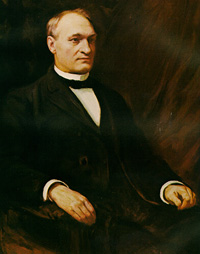John Griffin Carlisle
|
|
Carlisle was born in what is now Kenton County, Kentucky, and began his public life as a lawyer in Covington, Kentucky. Despite the political difficulties that taking a neutral position during the American Civil War caused him, Carlisle spent most of the 1860s in the Kentucky state legislature, and was elected lieutenant governor of the state in 1871.
After Carlisle's term as lieutenant governor ended in 1875, he ran for and won a seat in the United States House of Representatives. On the main issues of the day, Carlisle was in favor of coining silver, but not for free coinage, and favored lower tariffs. He became a leader of the low-tariff wing of the Democratic Party, and was chosen by House Democrats to become Speaker in 1883 over Samuel J. Randall, a leader of the party's protectionist wing.
In 1890, Carlisle was appointed to the United States Senate to fill the unexpired term of James B. Beck. When Grover Cleveland was re-elected to the Presidency in 1892, he chose Carlisle as his Secretary of the Treasury.
Carlisle's tenure as Secretary was marred by the Panic of 1893, a financial and economic disaster so severe that it ended Carlisle's political career. In response to a run on the American gold supply, Carlisle felt forced to end silver coinage. He also felt compelled to oppose the 1894 Wilson-Gorman tariff bill. These two stands were widely unpopular in the Democratic Party, and, in the end, Carlisle openly opposed 1896 Democratic presidential nominee William Jennings Bryan, supporting a third-party National Democratic Party ("Gold Democrat") candidate instead.
By the time he left the Cabinet in 1897, Carlisle was a political pariah. He moved to New York City, where he practiced law until his death.
References
- Garraty, John A. and Mark C. Carnes. American National Biography, vol. 4, "Carlisle, John G.". New York : Oxford University Press, 1999. (ISBN 9998632668)
- Williams, R. Hal. Years of Decision: American Politics in the 1890s. New York : Wiley, 1978.
This article incorporates facts obtained from the public domain Biographical Directory of the United States Congress.
| Preceded by: J. Warren Keifer | Speaker of the U.S. House of Representatives December 3, 1883–March 3, 1885; December 7, 1885–March 3, 1887; December 5, 1887–March 3, 1889 | Succeeded by: Thomas B. Reed |
| Preceded by: Charles Foster | U.S. Secretary of the Treasury 1893–1897 | Succeeded by: Lyman J. Gage |

